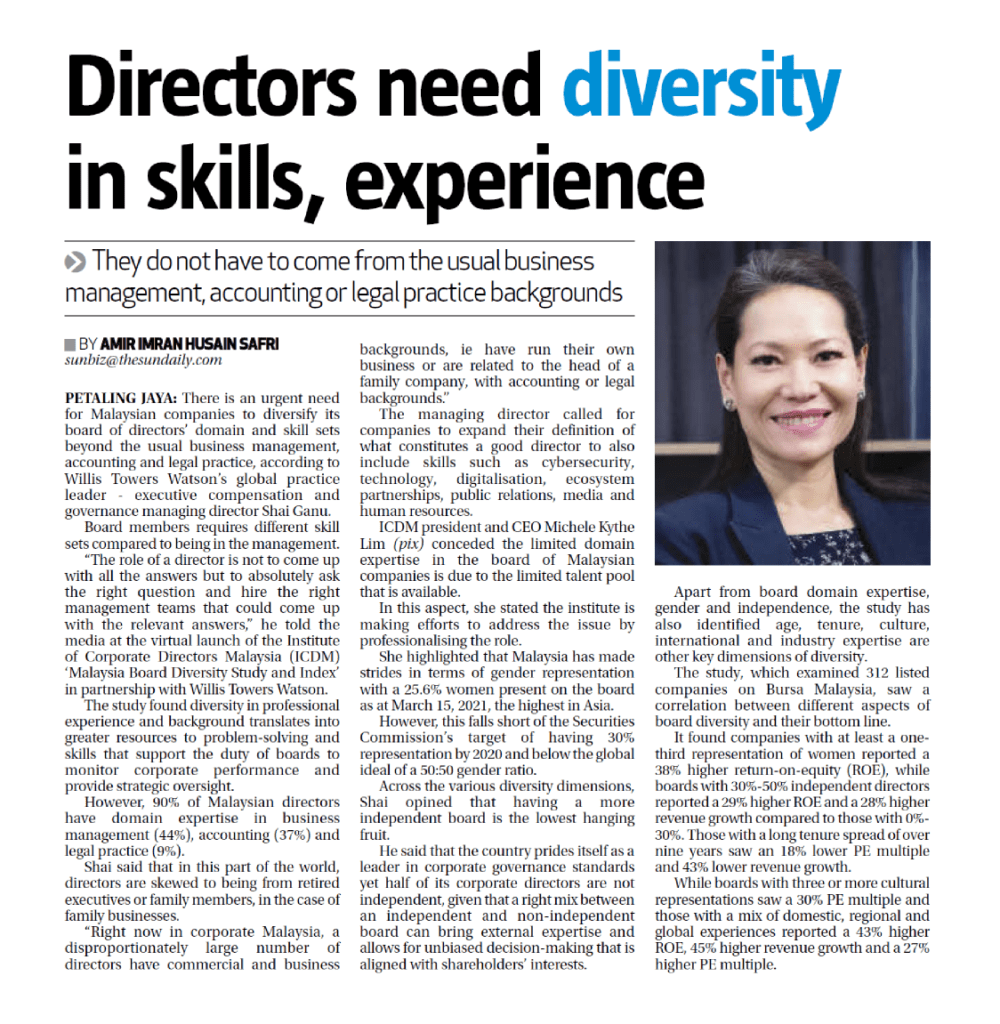
PETALING JAYA: There is an urgent need for Malaysian companies to diversify its board of directors’ domain and skill sets beyond the usual business management, accounting and legal practice, according to Willis Towers Watson’s global practice leader – executive compensation and governance managing director Shai Ganu.
Board members requires different skill sets compared to being in the management.
“The role of a director is not to come up with all the answers but to absolutely ask the right question and hire the right management teams that could come up with the relevant answers,” he told the media at the virtual launch of the Institute of Corporate Directors Malaysia (ICDM) ‘Malaysia Board Diversity Study and Index’ in partnership with Willis Towers Watson.
The study found diversity in professional experience and background translates into greater resources to problem-solving and skills that support the duty of boards to monitor corporate performance and provide strategic oversight.
However, 90% of Malaysian directors have domain expertise in business management (44%), accounting (37%) and legal practice (9%).
Shai said that in this part of the world, directors are skewed to being from retired executives or family members, in the case of family businesses.
“Right now in corporate Malaysia, a disproportionately large number of directors have commercial and business backgrounds, ie have run their own business or are related to the head of a family company, with accounting or legal backgrounds.”
The managing director called for companies to expand their definition of what constitutes a good director to also include skills such as cybersecurity, technology, digitalisation, ecosystem partnerships, public relations, media and human resources.
ICDM president and CEO Michele Kythe Lim (pix) conceded the limited domain expertise in the board of Malaysian companies is due to the limited talent pool that is available.
In this aspect, she stated the institute is making efforts to address the issue by professionalising the role.
She highlighted that Malaysia has made strides in terms of gender representation with a 25.6% women present on the board as at March 15, 2021, the highest in Asia.
However, this falls short of the Securities Commission’s target of having 30% representation by 2020 and below the global ideal of a 50:50 gender ratio.
Across the various diversity dimensions, Shai opined that having a more independent board is the lowest hanging fruit.
He said that the country prides itself as a leader in corporate governance standards yet half of its corporate directors are not independent, given that a right mix between an independent and non-independent board can bring external expertise and allows for unbiased decision-making that is aligned with shareholders’ interests.
Apart from board domain expertise, gender and independence, the study has also identified age, tenure, culture, international and industry expertise are other key dimensions of diversity.
The study, which examined 312 listed companies on Bursa Malaysia, saw a correlation between different aspects of board diversity and their bottom line.
It found companies with at least a one-third representation of women reported a 38% higher return-on-equity (ROE), while boards with 30%-50% independent directors reported a 29% higher ROE and a 28% higher revenue growth compared to those with 0%-30%. Those with a long tenure spread of over nine years saw an 18% lower PE multiple and 43% lower revenue growth.
While boards with three or more cultural representations saw a 30% PE multiple and those with a mix of domestic, regional and global experiences reported a 43% higher ROE, 45% higher revenue growth and a 27% higher PE multiple.
This article was first published in The Sun Daily on 8 April 2021.








